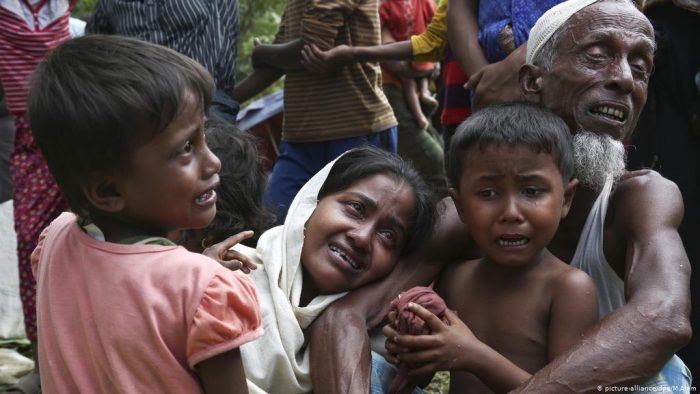
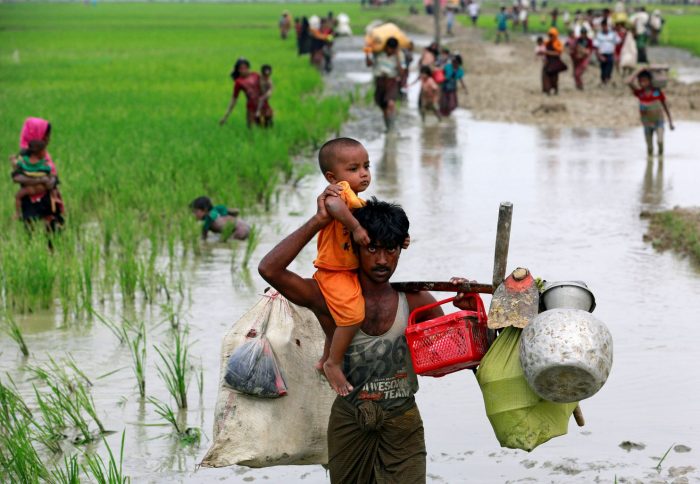
Page description
Explore the Rohingya crisis: a persecuted ethnic minority from Myanmar, their struggles, displacement, and the international response.
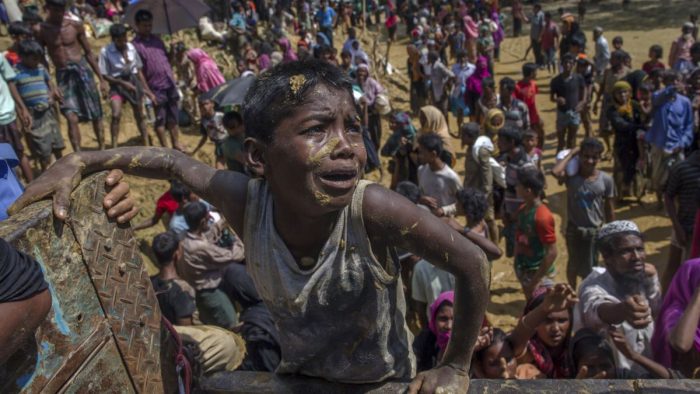

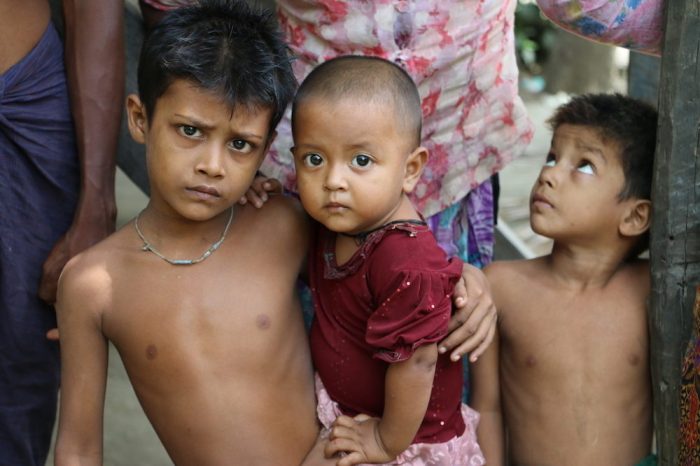
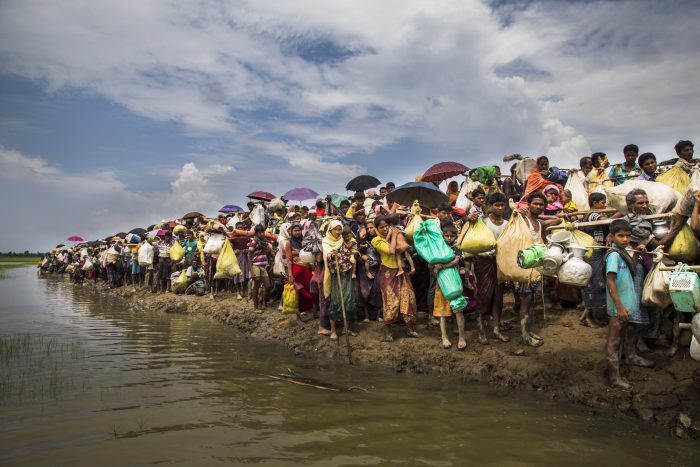
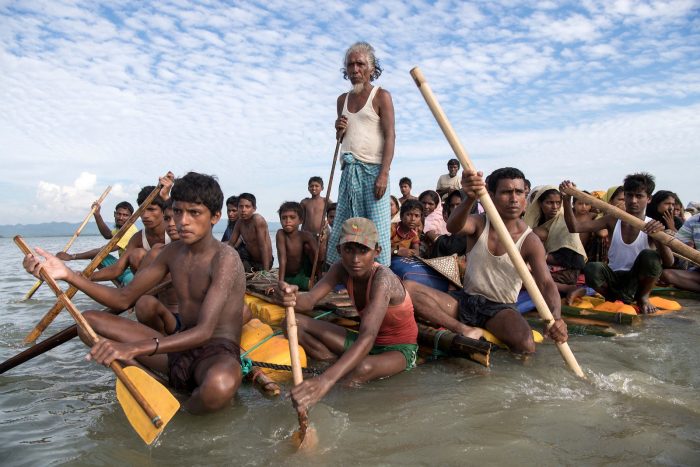
The Rohingya: A People Without a Home
The Rohingya, one of the most persecuted minorities in the world, have faced decades of systematic oppression, violence, and displacement. Forced to flee their homeland in Myanmar, hundreds of thousands have embarked on perilous journeys, seeking refuge in overcrowded camps and uncertain futures.
This page presents a comprehensive visual and narrative exploration of their plight—through powerful images, in-depth videos, and detailed texts that shed light on their suffering, resilience, and the ongoing struggle for justice.
📌 Topics Covered:
- The history of persecution against the Rohingya
- Forced displacement and life in refugee camps
- The global response and ongoing humanitarian crisis
Discover their story. See the reality. Understand the struggle.
De Rohingya: Een volk zonder thuis
De Rohingya, een van de meest vervolgde minderheden ter wereld, worden al decennia lang onderworpen aan systematische onderdrukking, geweld en gedwongen verdrijving. Honderdduizenden zijn gedwongen hun thuisland Myanmar te ontvluchten, op zoek naar veiligheid in overvolle vluchtelingenkampen en een onzekere toekomst.
Deze pagina biedt een indringende visuele en inhoudelijke verkenning van hun lijden—met krachtige beelden, diepgaande video’s en uitgebreide teksten die inzicht geven in hun leed, veerkracht en de voortdurende strijd voor gerechtigheid.
📌 Onderwerpen die aan bod komen:
- De geschiedenis van de vervolging van de Rohingya
- Gedwongen migratie en het leven in vluchtelingenkampen
- De wereldwijde reactie en de aanhoudende humanitaire crisis
Ontdek hun verhaal. Zie de werkelijkheid. Begrijp de strijd.
The Rohingya people are a Muslim minority group in Myanmar, which is a predominantly Buddhist country. For decades, the Rohingya people have faced persecution and discrimination from the Myanmar government, with restrictions on their movements, access to healthcare and education, and even citizenship. In recent years, the situation has escalated, with reports of widespread violence and human rights abuses, including rape, torture, and murder.
As a result, many Rohingya people have fled their homes and sought refuge in neighboring countries, such as Bangladesh, India, and Thailand. The conditions in these refugee camps are often dire, with limited access to food, water, and medical care. The Rohingya refugees also face discrimination and hostility from the local population and government authorities.
The international community has called on the Myanmar government to address the human rights violations and provide a safe and secure environment for the Rohingya people to return to their homes. However, the Myanmar government has been reluctant to acknowledge the severity of the situation or take action to address it, leading to ongoing suffering for the Rohingya people.
Some key points about Rohingya refugees fleeing Myanmar:
Persecution and violence: The Rohingya are an ethnic minority group in Myanmar, primarily living in the Rakhine state. They have faced longstanding discrimination, persecution, and violence from the Myanmar government and military. The Rohingya have been subjected to restrictions on their basic rights, such as freedom of movement, access to healthcare, and education. The situation escalated in August 2017 when security forces launched a brutal crackdown, resulting in widespread violence, including killings, rapes, and arson attacks on Rohingya villages, leading to thousands of Rohingya fleeing Myanmar.
Forced displacement: The Rohingya refugees have been forcibly displaced from Myanmar due to the violence and persecution they have faced. They have had to flee their homes, often in a desperate and traumatic manner, leaving behind their possessions and loved ones. Many Rohingya refugees have sought safety in neighboring countries such as Bangladesh, India, Malaysia, and other Southeast Asian nations.
Humanitarian crisis: The influx of Rohingya refugees has resulted in a humanitarian crisis, with many refugees facing dire conditions in overcrowded camps and settlements. Lack of access to clean water, sanitation facilities, healthcare, and education has resulted in widespread suffering, malnutrition, and disease among Rohingya refugees, particularly women, children, and the elderly.
Statelessness: The Rohingya face statelessness, as the Myanmar government has denied them citizenship, effectively rendering them stateless. This lack of recognition exacerbates their vulnerability, limits their access to basic rights and services, and hinders their ability to return to Myanmar or seek asylum in other countries.
International response: The Rohingya crisis has garnered international attention and condemnation, with calls for Myanmar to end the violence against Rohingya and uphold their human rights. However, finding a durable solution to the crisis has been challenging, with complex geopolitical, ethnic, and historical factors at play. Humanitarian organizations and host countries have been providing assistance to Rohingya refugees, but the scale and complexity of the crisis pose significant challenges.
Repatriation challenges: Efforts to repatriate Rohingya refugees to Myanmar have faced challenges, including concerns about the safety, security, and rights of returnees. Many Rohingya refugees are reluctant to return to Myanmar due to ongoing discrimination, violence, and lack of guarantees for their safety and rights. The repatriation process has been slow, with issues such as citizenship, land ownership, and security remaining unresolved.
Protection and justice: There have been calls for accountability and justice for the atrocities committed against the Rohingya, including allegations of genocide, crimes against humanity, and war crimes. International bodies, such as the International Criminal Court (ICC) and the International Court of Justice (ICJ), have taken up cases related to the Rohingya crisis, and there are ongoing efforts to hold perpetrators accountable and seek justice for the victims.
It’s important to note that the situation involving Rohingya refugees fleeing Myanmar is complex and multi-faceted, involving historical, political, social, and humanitarian factors. The key points provided above are a general overview and do not encompass all the nuances of the situation. For the latest and most accurate information, it’s recommended to refer to reliable and up-to-date sources.
1 In the jungle with Rohingya refugees feeling Myanmar – BBC News
2 Rohingya crisis through the eyes of Al Jazeera’s journalists
3 Aung San Suu Kyi: How a peace icon ended up at a genocide trial – BBC News
10 dec. 2019
4 The Rise and Fall of Myanmar’s Aung San Suu Kyi Explained | NowThis World
24 mrt. 2019
A non-violent freedom fighter? A war crimes apologist? Or is she something in between? Aung San Suu Kyi’s decades-long, non-violent struggle for democracy made her a hero around the world. But once appointed to office, many say her leadership, has been disappointing.
» Subscribe to NowThis World: http://go.nowth.is/World_Subscribe
» Watch the Previous Episode: https://go.nowth.is/2TTHZIn
Born on June 19th, 1945, in what was then Rangoon, Burma, Aung San Suu Kyi was destined to be defiant from the start.
Her father was none other than Aung San — the former military general who negotiated Burma’s independence from the British in 1947. He became known as a national hero, and the founder of modern-day Myanmar, which was then known as Burma.
But in 1947, when Suu Kyi was just 2 years old, everything changed. Her father was assassinated by a rival politician.
She went on to graduate from high school in 1964, and then studied with the global elite at Oxford University. There she met her to-be husband. Years later they settled in the United Kingdom, where they had two sons.
During this time, Suu Kyi continued to watch as her country was sinking further into dictatorship.
After nationwide protests against the one-party rule and the military dictatorship culminated in what later became known as the 8/8/88 Uprising protesters were in search of a leader. They looked to the then 43-year-old Suu Kyi to fill the shoes of her father — as a fighter for Burmese democracy.
And that’s exactly what she did.
But what was her journey to leadership and what would she do once she achieved her goal? And what would her leadership mean for the Rohingya in Rakhine state and the alleged ethnic cleansing was taking place in Myanmar?
5 Roundtable: Rohingya Crisis – One month on, can it be stopped?
6 Will The Rohingya Ever See Justice?
27 mrt. 2018
7 Rohingya news: the desperate journey to safety
25 sep. 2017
Video 28 minutes
Warning: this documentary contains themes that some viewers may find distressing.
IMPORTANT VIDEO
8 Rohingya’s Exodus: A special report on Myanmar
13 sep. 2017
VERY EMOTIONAL CONTENT
9 ‘Prison Island’ of the Rohingya: New island for refugees threatened by monsoon
27 mrt. 2018
23 jul. 2012
6 sep. 2017
12 Rohingya Documentary: ‘A boy with no name for a people with no identity’
18 sep. 2017
IMPORTANT CONTENT
13 Rohingya refugees arrive on Bangladesh beaches
14 Inside Story – The Rohingya: A humanitarian crisis
15 aug. 2012
Myanmar’s Rohingya community is one of the world’s most persecuted minorities who have been denied citizenship in their own country for decades. More than a million Rohingya are currently caught in a cycle of violence and poverty. Hundreds of thousands more are being denied access to aid in neighbouring Bangladesh. Why is this community such a pariah group? Guests: Mohamed Noor, Tridib Deb, Benjamin Zawacki.
At Al Jazeera English, we focus on people and events that affect people’s lives. We bring topics to light that often go under-reported, listening to all sides of the story and giving a ‘voice to the voiceless.’
Reaching more than 270 million households in over 140 countries across the globe, our viewers trust Al Jazeera English to keep them informed, inspired, and entertained.
Our impartial, fact-based reporting wins worldwide praise and respect. It is our unique brand of journalism that the world has come to rely on.
We are reshaping global media and constantly working to strengthen our reputation as one of the world’s most respected news and current affairs channels.
15 Outcast: Adrift with Burma’s Rohingya – REWIND
16 Why are Rohingya refugees stranded in no-man’s land? – Inside story
31 aug. 2017
It is a humanitarian crisis that is growing all the time. A week after former UN chief Kofi Annan released a report with recommendations to end years of persecution of the Rohingya people, the situation in Rakhine state in Myanmar appears to be getting worse.
Women and children are among the tens of thousands of the ethnic Muslim-minority Rohingya community trying to get across the border into Bangladesh. But Bangladesh doesn’t want them. Security is being tightened, and many people are being turned away, and are stuck in no-man’s land.
The refugees tell of attacks by the Myanmar military, of Rohingya villagers being killed and their homes set on fire. But the
Myanmar army says it’s launched a security crackdown on a rebel group after coming under attack itself.
The biggest obstacle to peace is Myanmar citizenship. The commission led by Annan says all restrictions on Rohingya should be lifted and describes them as the biggest single stateless community in the world.
But is the international community listening, and will it do anything about it?
Presenter: Hashem Ahelbarra
Guests:
Phil Roberston – Deputy Director – Human Rights Watch, Asia
Kim Jolliffe – Independent consultant working with development and humanitarian organisations in Myanmar
Tun Khin – President – U.K Burmese Rohingya Organisation
17 Crowded & Desperate: Rohingya in World’s Largest Refugee Camp Face Dual Crises of Cyclone & COVID-19
21 mei 2020
23 jan. 2020
The International Court of Justice, the world’s highest court, has ordered Myanmar’s government to prevent it’s military from committing acts of genocide against the Rohingya.
The ICJ has also warned that the Rohingya Muslim minority remain at serious risk of genocide and ordered the country to abide by the genocide convention, and take all measures within its power to prevent further killings.
The case brought by The Gambia last year accuses Myanmar of committing an ongoing genocide against its minority Muslim Rohingya population. Myanmar denies the allegations.
Thursday’s ruling comes just days after an inquiry backed by Myanmar’s government dismissed allegations of genocide. Myanmar’s leader Suu Kyi says the Rohingya have ‘exaggerated’ abuses.
So what does this ruling mean and will Myanmar abide by the orders?
Presenter: Mohammed Jamjoom
Guests
Thomas MacManus, Director of the International State Crime Initiative at Queen Mary University of London.
Azeem Ibrahim, Chair of the Center for Global Policy’s Rohingya Legal Forum and author of the book, ‘Rohingyas: Inside Myanmar’s Hidden Genocide.’
Simon Adams, Executive Director of the Global Centre for the Responsibility to Protect, and adviser to The Gambia on this case.
IMPORTANT CONTENT
19 Rohingya crisis: Reuters journalists held ‘for investigating Myanmar killings’ – BBC Newsnight
Back to menu
9 feb. 2018
***Warning: contains distressing images***
Reuters has revealed details of an investigation into a mass execution of Rohingyas by soldiers and villagers, which it says lies behind the arrest of two of its journalists in Myanmar.
In response, a Myanmar government spokesman said: “We are not denying the allegations about violations of human rights. And we are not giving blanket denials.” The government said that if there was strong and reliable primary evidence of abuses, they would investigate.
Newsnight is the BBC’s flagship news and current affairs TV programme – with analysis, debate, exclusives, and robust interviews.
Website: www.bbc.co.uk/newsnight
20 Has the world failed the Rohingya people? | Inside Story
Back to menu
12 dec. 2019
Two years ago, Myanmar’s military launched its crackdown on the Rohingya after attacks on its soldiers by members of the mainly Muslim minority.
The UN described what happened next as a ‘textbook example of ethnic cleansing’.
The army was accused of rape, torture and murder, and villages were burned to the ground.
Almost three-quarters of a million Rohingya were forced to flee to neighbouring Bangladesh, where they live in the world’s biggest refugee camp.
The Gambia wanted Myanmar’s military tried for genocide, and went to the International Court of Justice in the Hague.
But Aung San Suu Kyi, Head of Myanmar’s government, and a Nobel peace laureate, dismissed the case as “misleading and incomplete.”
Why is this one-time champion of human rights defending the army that kept her under house arrest for years?
Presenter: Stan Grant
Guests:
Brad Adams – Executive Director of the Asia Division at Human Rights Watch
Kyaw Win – Executive Director at Burma Human Rights Network
Priya Pillai – International lawyer and Head of the Asia Justice Coalition.
IMPORTANT CONTENT
21 Who will save the Rohingya? – The Stream
8 sep. 2017
22 What is really happening to the Rohingya? – The Stream
Live gestreamd op 21 sep. 2017
23 Persecution In Myanmar: Left For Dead (Part 1)
9 mei 2016
24 Human Trafficking in Southeast Asia: Left For Dead (Part 2)
IMORTANT CONTENT
25 Is the UN Failing the Rohingya? – Left For Dead (Part 3)
11 mei 2016
Watch Part 1 – http://bit.ly/1Tz0AgL
Watch Part 2 – http://bit.ly/1sacxna
In recent years, democratic reforms have swept through Myanmar, a country that for decades was ruled by a military junta. As the reforms took hold, however, things were growing progressively worse for the Rohingya, a heavily persecuted ethnic Muslim minority concentrated in the country’s western state of Rakhine.
The 2012 gang rape and murder of a Buddhist woman by three Muslim men ignited violent riots in which hundreds were killed as Rakhine Buddhists and Rohingya attacked each other. In the following months, tens of thousands of Rohingya were rounded up and forced to live in squalid camps; Human Rights Watch deemed the attacks crimes against humanity that amounted to ethnic cleansing of the Rohingya. Thousands of Rohingya have since attempted to leave the country, fueling the region’s intricate and brutal human trafficking network.
In the final part of our three-part series, VICE News correspondent Danny Gold reveals leaked internal UN documents that suggest an effort to keep concerns about the Rohingya quiet, and speaks to a former UN human rights officer about the organization’s passive response to the situation in Myanmar.
26 Left for Dead: Persecution of the Rohingya in Myanmar (Part 1)
27 Left for Dead: Human Trafficking of the Rohingya Refugees in Southeast Asia (Part 2)
27 sep. 2018
11 mei 2016
29 Myanmar: The Hidden Genocide | Al Jazeera Investigations
30 okt. 2013
Earlier this year a Buddhist woman was raped and murdered in western Myanmar. The authorities charged three Muslim men.
A week later, 10 Muslims were murdered in a revenge attack. What happened next was hidden from the outside world.
Bloodshed pitted Buddhists against minority Rohingya Muslims. Many Rohingya fled their homes, which were burned down in what they said was a deliberate attempt by the predominantly Buddhist government to drive them out of the country.
“They were shooting and we were also fighting. The fields were filled with bodies and soaked with blood,” says Mohammed Islam, who fled with his family to Bangladesh.
There are 400,000 Rohingya languishing in Bangladesh. For more than three decades, waves of refugees have fled Myanmar. But the government of Bangladesh considers the Rohingya to be illegal immigrants, as does the government of Myanmar. They have no legal rights and nowhere to go.
This is a story of a people fleeing the land where they were born, of a people deprived of citizenship in their homeland. It is the story of the Rohingya of western Myanmar, whose very existence as a people is denied.
Professor William Schabas, the former president of the International Association of Genocide Scholars, says: “When you see measures preventing births, trying to deny the identity of the people, hoping to see that they really are eventually, that they no longer exist; denying their history, denying the legitimacy of their right to live where they live, these are all warning signs that mean it’s not frivolous to envisage the use of the term genocide.”
IMPORTANT CONTENT
30 Video shows smugglers beating Rohingya refugees on boat during failed attempt to flee Bangladesh
15 dec. 2020
31 Who’s responsible for Rohingya refugees rescued at sea? | Inside Story
Back to menu
28 feb. 2021
Nearly 2,500 Rohingya refugees risked their lives last year by taking dangerous boat journeys.
They’re looking for safety, and better living conditions after years of systematic discrimination and persecution.
Rights groups are warning – thousands more could take such journeys hoping to reach countries mainly in Southeast Asia.
81 Rohingya who had been stranded in the Andaman sea for nearly two weeks – were rescued by the Indian coastguard on Friday.
Eight people died and many fell ill– suffering severe dehydration as they ran out of food and water.
The Indian government has been trying to arrange for their …..
Thumbnail
Proposed Description (Max 4 sentences) return to Bangladesh.
But Bangladeshi officials say they have no obligation to shelter the Rohingya –who were found closer to Myanmar and Indian territories.
So, what are the consequences if they’re sent back to Myanmar?
Presenter: Sami Zeidan
Guests:
Commodore C. Uday Bhaskar – Retired Navy Officer and Director of Society for Policy Studies, an independent Geo-political think tank.
Yasmin Ullah – A Rohingya Activist and Advocate.
Saad Hammadi – South Asia Campaigner with a focus on Bangladesh for Amnesty International.
32 Inside Myanmar Military Dictatorship | How Hope was Shattered | ENDEVR Documentary
25 feb 2024
On The Inside Of A Military Dictatorship | ENDEVR Documentary
Watch ‘How to Get Rid of a Dictator ‘ here: • How to Get Rid of a Dictator | Killin…
The entire world praised the military and Aung San Suu Kyi, when power was passed on to the democracy icon after 50 years of military dictatorship. One year later she defended an ethnic cleansing and had isolated herself from the public. This film tells you why.
33 Rohingya refugees on Myanmar’s brutal crackdown: ‘They slaughtered our people’
On 25 August 2017, the Myanmar military launched violent attacks against Rohingya people, and 700,000 fled their homes. Refugees who escaped to Bangladesh say today they are dealing with the trauma of witnessing mass killings, rape and the torching of villages, as they remain trapped in squalid camps
34 Myanmar’s Rohingya Genocide
14 feb 2020 #VICEonHBO
Over half a million Rohingya Muslims in Myanmar have fled brutal ethnic violence carried out by their government. While unprecedented numbers of refugees have found safety across the border in Bangladesh, their fates are uncertain. The international community has been reluctant to take action against Myanmar, and plans are underway to return those who escaped.
VICE’s Gianna Toboni travels to the Myanmar-Bangladesh border to see what the future holds for the world’s most persecuted minority.
This report originally aired May 6, 2018, on VICE on HBO.
35 Rohingya crisis: the world’s fastest growing humanitarian crisis- BBC News
19 okt 2017
As thousands of Rohingya refugees continue to pour into Bangladesh, Clive Myrie reports on the world’s fastest growing humanitarian crisis.
The plight of hundreds of thousands of Rohingya people is said to be the world’s fastest growing refugee crisis.
Risking death by sea or on foot, more than half a million have fled the destruction of their homes and persecution in the northern Rakhine province of Myanmar (Burma) for neighbouring Bangladesh since August 2017.
The United Nations described the military offensive in Rakhine, which provoked the exodus, as a “textbook example of ethnic cleansing”.
Myanmar’s military says it is fighting Rohingya militants and denies targeting civilians.
36 Myanmar: Radical Violence Against the Rohingya People | State-Organized Violence (Documentary)
21 mrt 2024
‘Exiled’ unveils the story of the campaign to erase the Rohingya people and explains the roots and historical context of the violence they have suffered.
Myanmar has a culture shaped by Buddhism, with a Nobel Peace Prize Laureate, Aung San Suu Kyi, as its de facto head of government. Yet one ethnic and religious minority has been subject to a state-organised campaign of violence. The genocide against the Rohingya started as early as 1978. The mass exodus of refugees to Bangladesh in 2017 was just the last straw in a decades-long campaign.
Over the decades, villages have been burned to the ground, men and women raped, and over two million driven from the country to live as refugees in miserable conditions. The story is told be eyewitnesses, including Rohingya, as well as former Burmese government officials and radical Buddhist monks who make plain their view that the Rohingya people, as Muslims and “foreigners,” have no place in their country.
This film was first released in 2019 by Shahida Tulaganova.
37 THE WAVE – The Story Of What Happens And Who You Are
1 sep. 2019
38 She Has Two Left Feet!
21 feb. 2013
We’ve all heard the expression “having two left feet”, which simply means clumsy, but people who try to help this woman put a shoe on her right foot are in for a shock when the big toe is on the wrong side! She really does have two left feet… or does she?